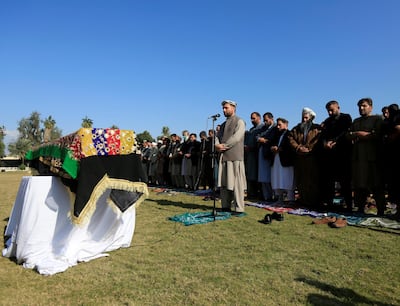Afghan journalist and women’s rights activist Malala Maiwand was shot dead by unidentified gunmen on Thursday morning in Jalalabad, the capital of the country’s eastern Nangarhar province.
The 25-year-old was killed alongside her driver Mohammad Tahir in a series of rising attacks against media workers across Afghanistan.
No group has claimed responsibility for the attack; with Taliban spokesperson Zabihullah Mujahid quickly denying the group’s involvement.
“The policy of the Islamic Emirate is to cooperate with journalists,” another spokesperson, Mohammad Naeem, said, adding that the group had always maintained positive interaction with media workers.
The Islamic State is active in eastern Afghanistan.
Ms Maiwandi, whose activist mother was gunned down five years ago, and who had worked for private television channel Enikas Radio and TV, had been speaking out passionately against injustices, the ongoing war and violence, as well as the difficulties of being a female reporter in conservative Afghanistan.

Since starting her young career, she had gained widespread respect from her colleagues.
“As a woman and a journalist, she had unique access to stories,” explained Ruhullah Anwari, a Radio Azadi reporter in Nangarhar. “She’d talk to widows and orphans, often reporting on human rights issues and even government corruption.”
Another local journalist, Zabiullah Ghazi, said that she had always fought hard to realise her dream of working as a TV anchor.
"Maiwand lived in a conservative part of the country, but she managed to pursue her career and worked at a television station in a city where most women continue to stay at home," he told The National.
Described as “strong and compassionate” by her colleagues, Ms Maiwand is one of over 50 journalists killed in Afghanistan since 1992, according to the Committee to Protect Journalists. In the first nine month of this year alone, the United Nations recorded almost 6,000 civilian casualties; over 2,000 of whom were killed.
The young reporter’s name resembles that of Afghan national folk hero Malala of Maiwand - known as the country’s Jeanne d’Arc - a woman who rallied local fighters against British troops at the 1880 Battle of Maiwand.
This Thursday, the sun had barely risen on a crisp Nangarhar morning when Ms Maiwand had left her house to head into work, taking her from her home through the bustling city of Jalalabad, filled with street vendors, rickshaws and heavy morning traffic. She met her attackers nearby her house and never returned home; instead, she was buried under a bright blue sky on the same day.
“The attackers fled the scene, so it is hard to know who - what person exactly - to hold accountable,” explained Babakher Khel, a Jalalabad police officer. “We live in a warzone. Anyone can easily become a target.”
Violence has peaked in Afghanistan over recent month, and media workers have increasingly become victims of brutal assaults.
Last month, well-known Radio Azadi journalist Elyas Dayee was killed in the southern Helmand Province when a bomb attached to his car exploded. Just days prior, former TOLOnews presenter Yama Siawash was murdered in a similar blast in Kabul.
Enikas Radio and TV had been targeted before, with its owner Engineer Zalmay kidnapped for ransom in 2018.
While Afghanistan has enjoyed relative press freedom over the past 19 years, media workers are increasingly concerned, saying they don’t feel safe anymore. Many have received threats.
As the Taliban and the Afghan government discuss a potential power sharing deal that could see the militants come back, the country’s future is uncertain.
“For us journalists, this is unsettling and scary,” Mr Ghazi said.
US troops are due to depart Afghanistan by next May, and with violence already on the rise - with US watchdog SIGAR saying that Taliban violence had been up by 50 per cent in the past three months - many Afghans fear for their future.
